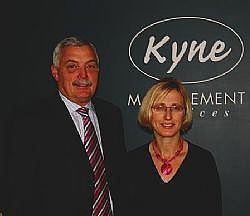Filling the director’s chair
Does size matter for good governance? More than a thousand New Zealand SMEs talk about their governance forthe future.
By Jens Mueller and Sandy Maier
Is it policing? Is it forward looking strategy? Is it the smell of success or death? Governance has made more headlines recently with dramatic failures, than through the recognition of the millions of small and mid-size firms around the world where owners and managers work hard every day to compete and succeed. Now written on the flag of every regulator, politician, consultant and investors, governance remains for many an intangible concept that is difficult to bring down to reality while working hard and long hours.
Clearly, bad governance sticks out like a sore thumb. It destroys reputations and credibility, it deters good people from wanting to work for the business, and it makes it harder for firms to find investors. We hear of it mostly in large, listed or publicly known enterprises where the dollar losses run into hundreds of millions, where rugby clubs are threatened with large fines or where staff blow the whistle and regulators swoop in for the kill. This is not a constructive way to point out the importance of good governance. Future disasters which we all think will never happen to us are not strong motivators to act in different ways.
By contrast, good governance gets little attention in the media and we now take it for granted in all enterprises that there is a clear and unmistaken direction throughout the firm about the right thing to do.
Bryan Thomson, CEO of Harcourts Group, says that at Harcourts we all know what it means to do the right thing and when we have choices, then that right choice is the one and only choice we make.
Governance is the special air that flows through the company, around all of its staff, whatever they do and wherever they are. It is set at the top and lived through all staff, so that it is clear to the stakeholders what this business stands for. Like a pledge card tattooed on the eyelids, we know in every situation, without special instruction or the need for help, what to do.
So if the parameters for good governance in a business are set at the top, who does it, and how do we communicate these rules of engagement throughout the organization, the stakeholders and the world at large?
Online survey
We have asked directors, investors and executives in more than 2000 New Zealand firms about their thoughts on governance and where they see needs and challenges in the future. This on-line survey is a practical way to understand what executives need, what directors can offer, and how the issue of governance is approached in businesses of all sizes. We were less concerned with the few hundred publicly listed firms, as these entities have learned to live in the fish bowl, seen by all and poked with a stick by anyone who wants to see how they can squirm.
With nearly 1000 replies from small and mid-size firms, we are much more concerned about the future of these businesses, which make up the bulk of our economic performance. The flower exporter from Tauranga and the fish processor in Nelson are much more important for us to understand real life governance needs, than the billion-dollar concern in Auckland.
This Directions 2006; Understanding Governance effort is operated by an MBA team from Waikato Management School, where six young managers use part of their study time to create practical solutions for real businesses in New Zealand. Our key objective was to find out whether companies and other organisations feel they have access to high quality directors, whether directors understand their roles fully and whether they have adequate skills to help lead firms into the future. Governance is not about managing through the rear-view mirror, and it is not exclusively about compliance and auditing. While managers ask what we need to do today, leaders challenge a firm to think about the future and the tools needed to be competitive and successful in the next decade. One of these tools, without doubt, is a good governance structure.
Rather than debating on TV why a CEO cannot get along with his Board, and detracting the whole firm for months from getting on with the job, governance can be a silent supporter or an explosive killer. When set-up correctly, good governance allows everyone to work towards the same goals and values.
The more exposed role of directors in New Zealand and their personal liability in some cases of corporate failures demands specific skills and talents that complement the operating management of a business.
Mystery One
A large number of firms recruit directors from an existing circle of friends. It is mainly existing directors and the CEO who tap a potential new director on the shoulder and ask for time and expertise. Is this really the best we can do? Does this system of recruitment create an ever-tightening corset around the company with fewer and fewer outsiders being solicited for their contribution?
No doubt many directors and CEOs have good friends, with rich professional experiences and abilities but when we look for the best should we not have access to the best everywhere, and not just to those in the next golf cart or living in the same town?
With more than half of the surveyed firms indicating international activities in their business, we need directors in small and mid-size firms with global backgrounds and experiences, we need leaders with proven business track records and we need those individuals as directors who can share information not easily available locally. We speculate that the quality of directors will need to increase sharply over the next few years, to maintain our businesses with a sharp edge for global competition.
Mystery Two
In our sample from a little over 2000 firms alone directors and investors indicate a need for more than 2000 new independent directors over the next five years. Clearly, small and mid-size firms are warming up to the idea of involving independent directors in the long-term strategic shaping of their business potential.
This does not mean that the majority of directors will be independent directors, although that would be a very desirable side effect and in line with global developments in other industrialized countries, but it shows an acceptance of the contribution independent directors can make.
Where do firms current directors and owners find these new contributors? There currently is no effective market for directors, there is no brokerage or Trade Me to connect businesses with the specific talents they need.
We speculate that there will soon be an electronic market place where potential directors can list themselves and where firms can browse to identify possible candidates worldwide. We know from the survey results that investors favour directors with specific business skills and accomplishments, over those with professional degrees or a long list of existing directorships. In such a new market place, owners and operators could quickly scan for the most suitable person to strengthen their Board.
Mystery Three
Why do directors join firms, especially small and mid-size firms those without the corporate jets, the board meetings in Paris and the headlines? What carrots will investors need to dangle in front of these people, to entice them to join the board of a small fashion designer shop in Dunedin or an insurance agency in Timaru?
They do it to make a difference! The majority of respondents confirmed that it is less the money they are after, but the ability to help, steer, and participate in the joy of seeing a job well done. While they are concerned about the level of personal risk, and largely look at their future fellow directors to determine how interested they are in taking on a directorship, there is a strong motivation to make a difference. This opens up the board room to a whole range of potential directors, most likely many who have never been directors before but are superb performers in their own right.
Out of this work with thousand of firms we will create a benchmark score, which allows investors, directors and executives to easily measure their own governance performance against real firms next door or across the oceans. This good governance score will point quickly to areas where governance structures and implementation can be improved and it will tell those who do a good job exactly that.
Rarely has such a varied group of companies and organisations come together to develop a good understand about governance in New Zealand. Leaders from a wide range of companies have volunteered their time to help shape this survey and distribute it.
Have you participated? Company directors, investors and corporate executives are invited to complete the survey, at no cost, and receive a copy of the national results. The survey is at www.worldsurvey.info. NZB
Dr Jens Mueller is CEO/Chair of global firms and Associate Professor for Entrepreneurship and Strategy at Waikato Management School.
Sandy Maier is a director and executive of large national and global firms.




